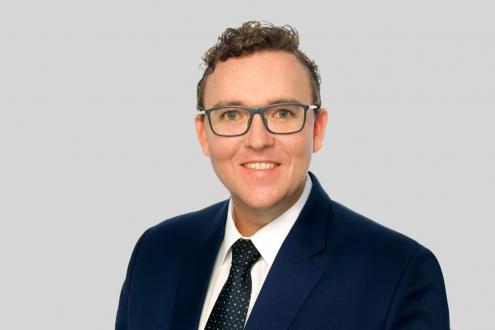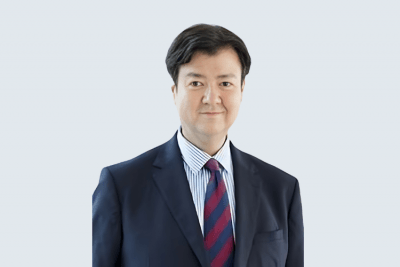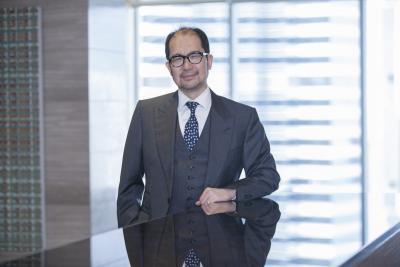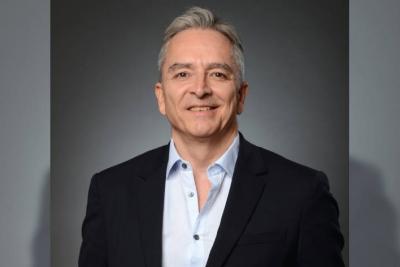Wealth Solutions & Wealth Planning
Investment Migration and Building Optionality in a Complex and Challenging World
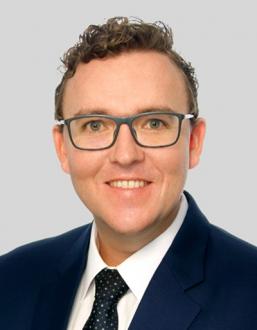
Dominic Volek of Henley & Partners
Apr 5, 2023
The world today remains unstable and challenging in so many ways. Here we are in 2023, and just in the past few years, we have all had to confront the global pandemic, the war in Ukraine, surging inflation, rising interest rates, falling markets, and to top it all, numerous other geopolitical crises are bubbling under, potentially ready to boil over. But amid all these troubles, HNW and UHNW clients have the financial ability, and often the time and the connections, to diversify their residence or even citizenship options, not just for themselves and their partners, but also for their children and their grandchildren. Global investment migration firm Henley & Partners has for nearly three decades been at the very leading edge of advice and expertise in this field, and has developed into a worldwide operation with over 40 offices, receiving enquiries from 209 jurisdictions in 2022. Hubbis met recently with Dominic Volek, the Dubai-based global Group Head of Private Clients and member of their Government Advisory Practice Group at Henley & Partners, where he is also a Member of the Group Executive Committee and retains the title of Head of APAC, which he held for some years before he left Singapore for the UAE in late 2020. He offered his insights on the latest whys and wherefores of global investment migration, explaining that amid the many ongoing uncertainties and the globalization of high wealth families, interest in residence and citizenship by investment continues to surge. And far from demand mostly coming as it did historically from emerging countries with weaker passports, interest from the US and other developed nations has been driving Henley & Partners’ growth. Meanwhile, there is greater diversity than ever before as more governments around the world launch or recalibrate their inward investment migration programs.
The expanding and buoyant investment migration sector
Dominic opens the conversation by noting that when the pandemic struck, wealthy and super-rich individuals realized that they were rather exposed if they held only one residence or citizenship, no matter how much money they had. “They had a moment of reckoning where many of them realized that it’s better to fix the roof while the sun is shining,” he explains.
At the same time, the wider ecosystem within the wealth management industry – the bankers, lawyers, accountants, trustees, family offices, and others – also saw the colours and hues of the investment migration sector more vividly and realised that this plays a very important part in robust wealth and estate planning.
“We have built on all that, continuing our program of educating these parties, so that they can bring these concepts to their clients armed with a genuine understanding of the issues at play and the starting points for this journey,” Dominic reports. “People in the wealth management ecosystem are much more engaged, far more on the same page now. We have developed even closer and more rewarding relationships with many of them, all leaders in their various fields.”
Evolving needs, evolving motivations
He steps back from the immediate to remind us of some of the history of investment migration, noting that there are many different reasons why investors and wealthy families have been interested in expanding and diversifying their domicile options.
Dominic recalls that the investment migration business began to move mainstream from the early 2000s and is now a multi-billion-dollar global industry, with more and more HNW and UHNW individuals seeing the advantages of acquiring a second residence and/or alternative citizenship and passport through a residence or citizenship by investment program.
In earlier days, the primary motivation for citizens of emerging nations, whose passports were far from gateways to the world, was global mobility and to obtain easier, visa-free travel. He cites, for example, the Philippines and Thailand as classic examples of countries where there is very significant and rapidly expanding private wealth but where citizens need to apply for visas for numerous countries. The same is true of India, Indonesia, Sri Lanka, Vietnam, and a variety of other countries in the APAC region, and indeed in the Middle East.
Demand extends from EM to DM
But whereas emerging markets used to be the core source of clients for Henley & Partners, Dominic reports that in recent years, and especially since the pandemic first struck, demand from the developed markets, particularly the US, has been at the forefront of driving the firm’s growth.
“Demand from the emerging markets remains remarkably strong, but the engine for growth in this industry has been the US for several years, with strong appetite also from other major economies such as the UK, Europe, Canada, even Australia,” he elucidates. “I can report that the US has become Henley & Partners’ biggest single source of clients since 2020, and it remains the single largest source of demand today”.
Of course, visa-free travel is not the driver for those developed market clients because they already have very good passports. Instead, they are looking to hedge against market and political volatility, an erosion of their civil liberties as happened during the pandemic, to mitigate their risks but also to access greater lifestyle optionality for themselves and their families.
“Armed with greater geographical flexibility, they can spread their often highly diverse assets further afield, and these moves can also help them open up new business, education, healthcare, and retirement opportunities,” he says.
He explains that nowadays HNW and UHNW clients often like to assemble a diversified domicile portfolio. Having multiple options in terms of where they can live or easily spend time is very valuable to such clients. “We have seen the significant spike in demand for second or third citizenships and residences from markets such as the US and the UK,” he reports.
Offering a few data points to support his claims, Dominic reports that the number of enquiries out of Canada last year increased by 36%, in the US their client base increased by 30%, and in the Philippines 45%.
And Dominic expands on this by adding that it is the next generations who so many of the private bankers and wealth managers are increasingly aiming to connect to.
“Remember that young, well-educated individuals from wealthy families are increasingly mobile by inclination and also increasingly liberated by technology to live and work where they like,” he says. “These programs are not only for the principals, as they increasingly appreciate the value of opening more and more doors for their children and grandchildren. This is especially important for clients in Asia that want to build a legacy, build their extended family’s futures.”
Asia and the Middle East – key markets
Dominic notes that he moved himself to Dubai from Singapore in late 2020 partly because of the additional freedom that the UAE offered at that time. He had been running Henley & Partners’ APAC business out of Singapore for roughly five years. Although he and his family loved life in Singapore, he reports that Dubai has proved to be an excellent alternative, for a variety of reasons, including being an ideal and central time zone for his global private client role and as a member of the four-strong global executive committee. From Dubai, he also enjoyed considerably more travel flexibility far earlier than he would have experienced in Asia.
Moreover, the rapid evolution of investment migration activity among the UAE’s wealthy has offered considerable potential for Henley & Partners to develop its business. And the growing appeals of Dubai, Ras Al Khaimah and the other Emirates for global inward investment migration have meant there is a strong inward flow of clients to service from across the world. “The UAE presents an increasingly robust two-way flow of good quality business for us,” Dominic says.
He also reports that Asia continues to grow apace as well, with the Singapore office now boasting a headcount of 35 and having expanded by some 75% in the past several years. Dominic explains that Singapore is the central hub for the whole of Asia, even though the firm has a significant office in Hong Kong, which serves the Chinese market. “We now have over 40 offices worldwide and Singapore is certainly among the largest,” he reports.
Interestingly, Dominic says China used to be a major engine of growth until 2020, but in fact, during the pandemic many wealthy people there decided China was the safest and best place to be throughout the crisis. “Things are changing again now as Europe and the US and most of Asia are fully normalized,” he explains. “China has reopened, and HNW and UHNW Chinese clients are again becoming very active. In fact, since the borders reopened, enquiries from China have surged about 600% - very quickly returning to pre-pandemic levels of demand and expected to continue to surge going forward.”
He reports great appetite from China for Europe’s ‘Golden Visa’ type programs in Europe, and for the very wealthy, Singapore, some of whom are establishing family offices there.
The firm also continues to grow its teams in satellite offices throughout South and Southeast Asia, which Dominic reports is a significant region for Henley & Partners.
Understandably, Dominic notes that the firm continues to see substantial demand from countries across Asia that have relatively weak passports in terms of visa-free travel, such as Bangladesh, India, Indonesia, the Philippines, Sri Lanka, Thailand, and Vietnam. And many have an interest in programs from markets such as the Caribbean, which are quite accessible in terms of cost, including for citizenship by investment, which then allows access to Europe’s Schengen Area, the UK, Singapore, Hong Kong, and other destinations.
Nevertheless, he says the main driver in Asia, especially for UHNW clients, is having the optionality of one or perhaps even a collection of residence alternatives for the client and their family. “In a volatile world where things can change rapidly, as we have seen very clearly in recent years, these clients truly recognize the value of this type of flexibility,” Dominic states.
Henley & Partners’ initiatives and differentiation
A key ongoing and comprehensive effort that Henley & Partners makes is around education, a development that Dominic explains in considerable detail in this article: https://hubbis.com/article/investment-migration-a-pathway-to-the-best-education-options-for-your-children.
“We have seen a lot of interest in our recently launched education services offering where we can assist clients and their children with a placement into the top educational institutes around the world from the US, the UK, Switzerland and down to Australia,” he explains. “The interest is from the clients, but also from many of the financial intermediaries that we work with, in terms of their clients wanting to have a conversation about their children's education opportunities abroad, and how we can assist them with that.”
Other key areas of differentiation for Henley & Partners include the firm’s scale and history, now providing truly global coverage.
“The global footprint we have created allows the firm to handhold private clients from their home market all the way through to obtaining their new residence or even citizenship,” he states. “Moreover, we can also handle the rising number of multiple applications, for example from UHNW clients and families assembling their portfolios of alternatives.”
He notes that Henley & Partners also has a deep understanding of the evolution of the programs themselves as the other core business for the firm, right from the outset, has been advising governments around the world on the formulation of their own residence and citizenship by investment programs.
“We have a very clear understanding of the issues and developments involved from many years of working with both governments and private clients,” Dominic explains. “Actually, coming out of the pandemic, we are speaking to more governments than ever in our history as they look either to create new offerings or revitalize existing programs, as a means of driving additional FDI to their shores.”
Due diligence, KYC, and AML
Dominic reports that another area of significant differentiation for Henley & Partners is the firm’s credibility and trustworthiness. “We are selective in the clients we work with and conduct our own due diligence on those clients,” he explains. “These programs are increasingly in demand, and governments want to make sure that the right calibre of people and families are applying.”
The firm has a proven and rigorous filtering process to weed out those who do not meet the necessary onboarding and due diligence criteria.
“Naturally, before we onboard any client with any program, we must conduct our own analysis as to whether these individuals and their families are bona fide,” he reports. “In this regard, we are actually neatly aligned with the compliance and regulatory side of the wealth management industry. Of course, if clients come to us from highly reputable sources, then we are much of the way there already. That is a reason we like working with the big institutional intermediaries.”
He also explains that Henley & Partners has a long-established reputation to uphold in an industry where there are plenty of charlatans and less scrupulous competitors, all of them much smaller and usually locally based.
“Henley & Partners has been doing this now for over 25 years, and we are far and away the largest global pure play investment migration firm in the world, and we take numerous clients from first meetings all the way to successful outcomes,” he reports. “And as a result of this great attention to detail, clients can be highly confident that once they pass Henley’s screening, they will be successful in their applications.”
He also explains that as demand for residence and citizenship by investment grows, countries are themselves implementing more rigorous screening processes to ensure that applicants are suitable and meet the necessary criteria.
“That actually plays to our expertise and strengths and offers more room to truly differentiate our firm,” he states. “Without naming names, I should add that we also steer clear of programs from jurisdictions that we believe are not sufficiently robust in terms of their screening and who they will accept.”
The clients and their missions
Dominic reports that the first phase of working with clients is to determine their objectives. Some of them might want to physically relocate to a country, but the vast majority of clients, he reports, do not plan to move.
He explains that this is a very important point that Henley & Partners emphasizes with the bankers and intermediaries they work with, as most clients prefer to stay where they are. “Although we have actually seen more people physically relocating in recent years, they mostly like to simply avail themselves of their residence alternatives as options, as those programs generally require them to spend little or no time in those jurisdictions, unless they want to,” he reports. “That is why all the various golden visas in Europe are very attractive, so too the Dubai program, and also the Caribbean citizenship by investment programs.”
Henley & Partners’ clients therefore generally seek the optionality these programs offer as alternatives for the future should their lifestyle expectations change, or perhaps their business plans, or if geopolitical or other unexpected events occur that force their hands. “They want the residence or citizenship with as little hassle as possible,” Dominic says. “They have the financial capacity, and they prefer as few obstacles as possible around the investment. If the investment required is in property, they like to be able to manage that from afar as simply as they can.”
The family profile is also important, as there are different ways to structure applications for each different program. He notes that not only can children be included up to a certain age, but in quite a number of programs, the parents of the primary applicant and indeed parents-in-law can also be included.
And then timing is very important, as some clients are in a great rush, while others are more relaxed about the timeframe. Residence is naturally quicker and simpler, and less expensive, to obtain, while citizenship requires considerably more time, complexity, and cost.
Choosing the right program
Dominic explains that Henley & Partners is naturally constantly updating and refining its selection of preferred investment migration programs around the world, and recently launched the Henley Ultimate Portfolio, which includes a bespoke suite of leading residence and citizenship by investment programs that can be acquired concurrently, through a single, streamlined application process, carefully managed and facilitated by a dedicated international advisory team.
Some of the most sought-after residence programs are summarised in this article curated by Dominic, which can be found alongside this piece, or at this link: https://www.hubbis.com/article/protect-your-wealth-via-residence-by-investment-in-investor-friendly-jurisdictions.
A win–win scenario
To offer more context on the programs and their evolution, Dominic explains that it is an extremely competitive world nowadays, and governments are regularly creating, refining, upgrading and also re-launching their offerings. “These programs help economically, bringing in debt-free liquidity but also spending power, and as we know, government finances are stressed the world over and in much need of boosting,” he comments.
Henley & Partners’ selection of programs is based on the quality and integrity of those offerings and their value to clients around the world. “This is certainly not a static field, and our selection is dynamic, in that we will add to it, or delete from it, based on the proposition and the outlook,” Dominic reports.
He also reports that programs close when they have reached their quotas. For example, Montenegro’s citizenship by investment program closed at the end of 2022, as it was scheduled to, after a number of successful years.
Key priorities
Dominic zooms in to focus on what he considers to be his and the firm’s key priorities in the year ahead. First up is to drive continued and sustained growth in markets where the firm is already very strong, hiring new talent from front to back to enable top-class service.
“This is a very personal business, and we need to deliver top quality advice and expertise, but also a seamless and secure client experience, as we are dealing with very personal data and insights on these clients,” he reports. “We are fully GDPR compliant, and we greatly value the protection of privacy and our clients’ information.”
Secondly, Henley & Partners is reviewing new programs they might consider for clients, including from Africa, South America, Eastern Europe, and Asia. “We also track refinements to programs, for example, from Indonesia and Malaysia, that might make them more attractive and viable for our clients.”
On the government advisory side of the business, Henley & Partners is also expanding its clientele and working with long-term clients to help re-launch or refine their existing programs. “We have helped raise some USD 10 billion in direct foreign investment through these programs, and with governments around the world hunting for additional income, the diversity of the range of programs will continue to expand.”
Finally, the expansion of Henley & Partners’ offering is another mission. He cites, for example, its educational services and placement initiative – Henley & Partners Education – and says the firm also recently launched Henley & Partners Concierge, which provides a wide range of travel and lifestyle services to clients. “We will develop in areas that do not in any way conflict with our financial intermediary partners, and in fact in many cases that complement our mutual relationships,” he says.
Working with the wealth management community
Dominic draws the conversation towards a close by highlighting the close relationships Henley & Partners has developed, and continues to build, within the wealth management community.
“We offer a service that more and more of the clients of the private banks, the EAMs, the family offices, and the IFAs like and want,” he says. “Wealth, estate, and legacy planning are all areas that have become far more prominent for HNW and UHNW clients all over, and alternative residence and citizenship is now central to the overall planning. To be able to open the door to these concepts and then pass clients to the safest pair of hands – Henley – in our experience helps achieve even more holistic client relationships.”
Dominic adds that the firm also works very closely with the broader professional services community serving wealthy clients, such as lawyers, tax advisors, trustees, and fiduciary companies, as well as others who might benefit from what are often two-way referrals of clients. “It fits the bill for all of them, as clients prefer to look holistically at their wealth and their total planning, not only for themselves but their families,” he comments.
As to the precise manner in which Henley & Partners works with the wealth management community and professional services firms, Dominic reports that there are two primary models. One option is a fee sharing model for successful client referrals. The other – and he says this is becoming more prevalent – is the reciprocal referral basis, which works particularly well in the major financial centers worldwide.
A trusted partner…
Dominic’s final word is that Henley & Partners has the scale, the history, and the reputation, and its partners know that the firm is reliable and will never stray into their areas of expertise and service. “We pride ourselves on our professionalism, our discretion, and our propriety, and those partners who bring their private clients to Henley’s doors know their clients will receive the highest levels of care and service, and that there will be a genuine relationship of trust and reciprocity. It is a win–win.”
A Snapshot of Popular Residence Programs in Investor-Friendly Jurisdictions
In a bid to boost their economies, sovereign states are vying for funds from affluent individuals and entrepreneurs and endorsing their residence and citizenship by investment solutions. The multi-faceted volatility that is being displayed in markets and across societies underlines how critical it is for governments to adapt, rebuild, and recover.
In parallel, high-net-worth individuals and investors are also navigating the tumultuous post-pandemic seas, plagued with soaring inflation rates, shifting labor market trends, and the ongoing conflict in Ukraine. This has resulted in a sustained surge in demand for alternative residence and citizenship, with Henley & Partners receiving the highest number of investment migration program enquiries on record in 2022 — an increase of 45.5% compared to the previous year, which was itself record-breaking.
Now more than ever, private clients are seeking out the most suitable residence by investment programs, also known as golden visas, in order to protect their families’ legacies and security and safeguard their wealth. To assist investors in the decision-making process, we recently launched the Global Residence Program Index 2023, a comprehensive benchmarking of the world’s 26 most important residence by investment programs and an interactive analytical tool for investors, which assesses residence programs based on a variety of parameters, including quality of life, investment requirements, and tax.
Wealth preservation in the post-pandemic era
While applicants for residence programs benefit from greater travel mobility and the optionality of living, working, and doing business in a domicile of their choice, other factors such as wealth preservation are also driving this bullish appetite for investment migration offerings.
In response to the pandemic, many governments have proposed new wealth taxes, increased capital gains dues, and higher corporate taxes such as the OECD’s global minimum corporate tax, as solutions for restoring wealth equality and replenishing public resources. The latest is the Biden administration’s announcement of numerous tax proposals to fund new government investments such as infrastructure, education and family programs, that total almost USD 4.7 trillion in new taxes targeted at businesses and high earners.
These proposals are encouraging rising numbers of well-heeled individuals and successful entrepreneurs to apply for residence programs in the countries featured below, which have more favorable fiscal frameworks.
UAE — A wealth hub in 2023
The UAE is spearheading a surge in interest among affluent investors with its competitive, agile approach to adapting regulations and remains a powerful magnet for capital, talent, and wealth, and its golden visa is now valid for an initial period of 10 years across all investment categories. As the Henley Private Wealth Migration Dashboard revealed, the UAE was projected to see the highest net inflow of high-net-worth individuals (with wealth of USD 1 million or more) globally last year, at 4,000. Investors from all over the world continue to relocate to the country either in a private capacity, with their businesses, or both, and many are drawn by its favorable tax regime — with no personal income, capital, net worth, or withholding tax (except for those levied in the domestic banking and oil sectors), and several double-tax treaties in place.
Monaco — The French Riviera’s alternative residence of choice
Monaco residence is an enviable proposition for those with the means to call this picturesque city-state their home. Strategically situated on the French Riviera, it offers tax-free dividends, zero (foreign sourced) income taxes, and zero capital gains taxes to private clients who can demonstrate sufficient funds to qualify. While it may boast some of the most expensive real estate and rental prices in the world, the tax incentives and quality of life in Monaco are second to none. A hub for ultra-high-net-worth individuals, there are many factors contributing to the Principality being an excellent location for investors.
Greece — A highly coveted golden visa
One of the top alternative residence options in Europe, the Greece Golden Visa Program requires a minimum real estate investment of EUR 250,000 to be eligible for a renewable five-year residence permit. Drawn to its Mediterranean lifestyle and scenic beaches, wealthy individuals and expats who choose to relocate to Greece under the program also benefit from numerous tax incentives. Golden Visa investors who decide to transfer their tax domiciles can pay a lump-sum tax of EUR 100,000 for 15 years, regardless of the amount of foreign-sourced income they receive, which has drawn many high-net-worth individuals to Greece, and Athens is increasingly attractive due to its pro-business environment. Effective 1 May 2023, the real estate investment will double to USD 500,000 in certain parts of Greece, including most of Athens, Thessaloniki, and the islands of Mykonos and Santorini, so now is the perfect time to acquire Greek residence by investing in an alternative home in Europe.
Portugal — A gem on the Iberian peninsula
For those seeking a cosmopolitan lifestyle in an idyllic and affordable European country, Portugal, ranked 1st overall in Henley & Partners’ Global Residence Program Index, offers the perfect solution with its flexible Portugal Golden Residence Permit Program and favorable non-habitual-resident tax scheme. Golden Residence Permit holders who opt to relocate to Portugal can obtain a 10-year tax exemption on most foreign-sourced income in addition to enjoying zero wealth taxes. Added to that, as cryptocurrency held for more than a year is currently exempt from capital gains taxes, Portugal is a hub for long-term crypto holders. At the time of writing, the future of the program is uncertain after the government’s proposal in February to end it, but until further information is announced, it’s business as usual and investors can still apply by making a minimum real estate investment of EUR 280,000.
Cyprus — A thriving hub between Europe and the Middle East
Investors keen to secure permanent residence in the international trade nexus of Cyprus can do so via the Cyprus Permanent Residence Program by investing a minimum of EUR 300,000 net of taxes in real estate. Alternatively, shares and units in funds are other eligible investment classes. Affluent individuals, entrepreneurs, and investors place great value on the optionality to reside in a jurisdiction of their choice, which is why they find Cyprus’s alternative residence solution so attractive. High-net-worth individuals who spend 60 days a year on the island can qualify for the non-domicile regime for a period of 17 years and enjoy tax-exempt dividends and interest. They can also benefit from no capital gains on the sale of shares (unless the underlying assets are Cypriot real estate), no inheritance, no gift taxes up to a third degree relative, and zero wealth taxes. Cyprus also has one of the lowest corporate tax rates in the EU.
Italy — La dolce vita forever
The Italy Residence by Investment Program grants visa-free travel in Europe’s Schengen Area as well as the option to acquire Italian citizenship after 10 years of residence under special conditions. To qualify, investors must have either EUR 2 million in government bonds, EUR 500,000 in company shares (EUR 250,000 for start-ups), or EUR 1 million invested in philanthropic or cultural projects. Alternatively, the Elective Residence Program is suitable for individuals who can prove their stable annual income at a certain quantity from abroad. While there is no requirement for permit holders to spend any minimum number of days in the country, those who choose to make Italy their tax domicile can pay an annual lump sum of EUR 100,000 on any foreign-sourced income under the flat tax regime.
Namibia – An African gem
Recognized for its highly stable political and economic environment, Namibia is considered among the safest nations in Africa. The democratic country offers an impressive infrastructure and an excellent quality of life. The Namibian government is actively seeking foreign investment to boost economic growth and diversify the economy and provides many opportunities for international investors seeking a foothold and growth on the African continent, including tax incentives, financing, and a one-stop bureau service for international companies. Namibia offers an attractive territorial tax system, which means that residents will not generally be taxed on income generated outside the country. To gain a work permit and residence rights in Namibia, investors can acquire real estate with a minimum value of USD 300,000 through a company in the modern and sophisticated President’s Links Estate in Walvis Bay.
The Global Residence Program Index 2023 is indispensable for all those considering residence by investment, enabling investors to select the factors that matter most to them and their families. Alternatively, the Global Citizenship Program Index 2023 enables comparisons of citizenship by investment programs, and the Henley Ultimate Portfolio can be used to find the ultimate combination of alternative residences and citizenships to unlock global access, mitigate risk, and create opportunity.
To further explore which investment programs are most suited for you or your clients’ particular circumstances, reach out to Henley & Partners, the global leader in residence and citizenship by investment.
The web version of this article can also be found here: https://www.hubbis.com/article/protect-your-wealth-via-residence-by-investment-in-investor-friendly-jurisdictions
Case studies
Several Indonesian clients have bought property on the Greek islands. Many want to chase the sun and live there for part of the year and then earn a rental income in euros when they are back home. They are also able to enjoy visa-free travel to Europe’s Schengen Area, avoiding the onerous and expensive visa application processes.
Many others from countries such as the Philippines that permit dual citizenship have opted for an apartment in Portugal, so that their children can live and study at universities across the EU in addition to enjoying visa-free Schengen Area access. By the time the students earn their master’s degree after five or so years, the whole family is eligible to apply for Portuguese citizenship. Spain is also rising in popularity, although residents may apply for citizenship only in their 10th year of residence in Spain. However, Sephardi Jews and citizens of Equatorial Guinea, Latin America, and the Philippines can apply for Spanish citizenship after only two years of effective residence in Spain.
Some British clients who are approaching retirement buy property in Thailand so they can enjoy a better quality of life once they retire, at a fraction of the cost of living in the UK. Others buy property in Europe to reclaim their membership of the EU in the wake of Brexit. Many US citizens and even some from Japan — which has had the strongest passport in the world for over three years — opt for investment migration for tax optimization reasons.
While India does not permit dual citizenship, many wealthy Indian families take residence elsewhere so they can spread their wealth and access opportunities across multiple territories. The grandparents might live in Thailand for its attractive and affordable lifestyle, the children might be in Europe taking advantage of the excellent education opportunities, while the family business may be based in Dubai.
In short, alternative residence and citizenship can benefit the whole family.

Group Head of Private Clients and Member of the Executive Committee at Henley & Partners

More from Dominic Volek, Henley & Partners
Wealth Solutions & Wealth Planning
Preserving Intergenerational Wealth: Views from Investment Migration Expert Dominic Volek
Wealth Solutions & Wealth Planning
Protect Your Wealth via Residence by Investment in Investor Friendly Jurisdictions
Wealth Solutions & Wealth Planning
Henley & Partners’ Group Head of Private Clients Surveys the Current World of Investment Migration
Latest Articles


